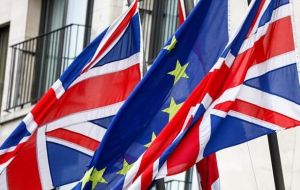MercoPress. South Atlantic News Agency
Bank of England says it has a duty to talk about the Brexit referendum
 BoE governor Carney said the vote was the biggest risk to the UK's financial stability and pointed out that uncertainty was already hitting the growth outlook.
BoE governor Carney said the vote was the biggest risk to the UK's financial stability and pointed out that uncertainty was already hitting the growth outlook.  The Bank warned uncertainty over the EU referendum could cause “some softening” in growth in the first half of 2016 as well have an impact on sterling .
The Bank warned uncertainty over the EU referendum could cause “some softening” in growth in the first half of 2016 as well have an impact on sterling .  However Carney said the Bank had not made “and will not make” any overall assessment of the economics of the UK's EU membership
However Carney said the Bank had not made “and will not make” any overall assessment of the economics of the UK's EU membership It is the Bank's duty to talk about the European Union referendum risks, argues the Bank of England governor Mark Carney, dismissing accusations the Bank is too political. The referendum takes place on 23 June and has become highly controversial.
“Assessing and reporting major risks does not mean becoming involved in politics; rather it would be political to suppress important judgments,” he told a House of Lords committee.
Carney said the vote was the biggest risk to the UK's financial stability and added that uncertainty was already hitting the growth outlook.
The governor said that while the Bank of England had not made “and will not make” any overall assessment of the economics of the UK's EU membership, assessing the implications were necessary for it to do its job - maintaining monetary and financial stability.
“As with the Scottish Referendum, we will communicate as much as is prudent about those plans in advance of any risk materializing and as comprehensively as possible once risks have dissipated,” he added.
The governor also reiterated he saw “signs of growing uncertainty about the UK's macroeconomic outlook related to the referendum”.
There is the possibility that a vote to leave the EU would “reinforce existing vulnerabilities” in the UK economy, including a risk around the UK's trade deficit, he added.
“I think it's safe to say that it [the UK current account deficit] is running at a rate around 5%... and that is remarkably high for a large advanced economy... The risk around the challenge... is that the financing terms change on that current account. Increased cost to the economy - [a] consequence of that is a sharp slowing of the economy.”
Mr Carney also refused to comment in detail on Monday's Treasury report which warned that the UK economy could be 6% smaller by 2020 if it left the EU, but said the report's “broad approach, to me, makes sense”.
He said a vote to Leave “might result in an extended period of uncertainty about the economic outlook” which would be likely to affect demand in the short term and could affect the supply side economy.
Mr Carney's appearance in front of the committee comes just days after the Bank of England said the EU referendum could hurt growth in the first half of this year. The Bank warned uncertainty over the EU referendum could cause “some softening” in growth in the first half of 2016.
It also said sterling had also been affected by the uncertainty ahead of the vote.




Top Comments
Disclaimer & comment rules-

-

-

Read all commentsStaying in the EU also brings a degree of uncertainty. Claiming that a Brexit contains many unknowns without saying the same about the EU is disingenuous.
Apr 20th, 2016 - 06:57 am 0I am a huge an of the EU if it suits the needs of a member. I just don't think it suits the UK any longer. The EU will continue without the UK and vice versa.
The EU is not some never-changing entity. It will change and evolve and that is uncertainty in itself.
As for this idea that the UK will have to deal with the EU like Switzerland and Norway do totally disregards the difference in economic size and importance (world's 19th and 28th compared to 5th largest).
“Mr Carney also refused to comment in detail on Monday's Treasury report which warned that the UK economy could be 6% smaller by 2020 if it left the EU, ”
Apr 20th, 2016 - 09:28 am 0Wordplay. The treasury report actually says that the UK economy will be 10% better off by 2020 if they leave the EU as opposed to 16% if they stay.
This overpaid and underperforming Canuk 'friend' of Osborne needs to either tell the complete truth with a balanced view and let the readers make up their own minds or STFU.
Apr 20th, 2016 - 11:04 am 0Commenting for this story is now closed.
If you have a Facebook account, become a fan and comment on our Facebook Page!